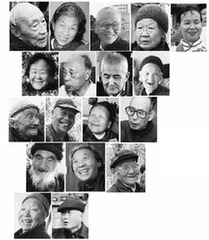全國(guó)人大代表、中國(guó)人口與發(fā)展研究中心主任馬力指出,中國(guó)目前正面臨應(yīng)對(duì)人口老齡化的“關(guān)口’”,必須抓住機(jī)會(huì),盡快建立城鄉(xiāng)統(tǒng)籌的養(yǎng)老保障制度。如果錯(cuò)過(guò)這個(gè)時(shí)機(jī),中國(guó)將付出更大成本。據(jù)介紹,中國(guó)在2000年正式進(jìn)入老齡社會(huì),其60歲及以上老年人口占總?cè)丝诘?0.1%。目前,中國(guó)80歲以上高齡老人每年以3.7%的速度增長(zhǎng),預(yù)計(jì)2020年將達(dá)到2200萬(wàn)人,2050年將達(dá)到8300萬(wàn)人,屆時(shí)中國(guó)將成為一個(gè)高齡社會(huì)。

 |
|
China formally became an aged society in 2000, when the population aged 60 or above accounted for 10 percent of its 1.3 billion people.
|
China will pay dearly if it does not act now to build up an old-age social security system, as its population aged 80 or above will hit 83 million by 2050, a population expert has warned.
"The proportion of working people to retirees is still low at the moment, if we missed the chance, we will pay a dear cost," Ma Li, vice director of China Population and Development Research Center, told Xinhua Tuesday.
China formally became an aged society in 2000, when the population aged 60 or above accounted for 10 percent of its 1.3 billion people.
With an annual growth rate of 3.7 percent, China's population aged 80 or above will reach 22 million by 2020, and 83 million by 2050, according to Ma, a deputy to the 11th National People's Congress (NPC), China's legislative body.
In contrast to developed countries, China entered the aged society while it is still a developing country, said Ma, on the sidelines of the NPC annual session in Beijing.
"China is not yet ready for the aged society. It does not have a complete old-age social security system. There are not enough resources. Fiscal support is scarce. And the risk is ever rising," said Ma.
The lawmaker said China must act now to set up an old-age social security system that covers both rural and urban population.
Such a system should be based on the care of the old people by their families, backed-up by community-level services networks and with old folks homes as a supplement, she said.
Ma stressed that China has the capacity to establish a proper old-age social security system.
China's population and economic structures and its level of urbanization is well beyond the stage at which developed countries began to establish old-age social security systems for their rural populations, said Ma.
(Xinhua)

(英語(yǔ)點(diǎn)津 Helen 編輯)